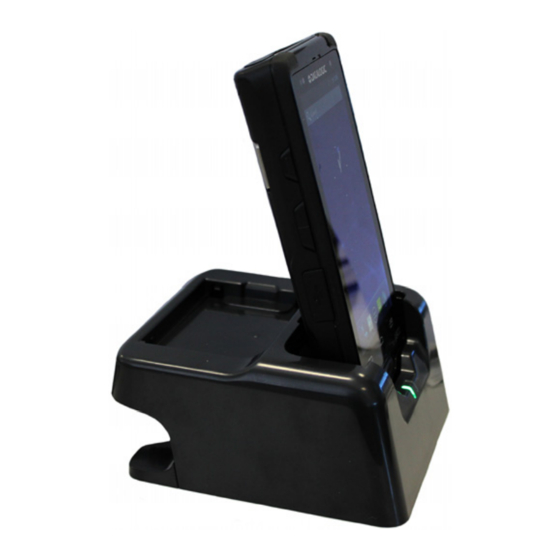Datalogic DL-AXIST Single Ethernet Dock Manual de início rápido - Página 2
Procurar online ou descarregar pdf Manual de início rápido para Estação de ancoragem Datalogic DL-AXIST Single Ethernet Dock. Datalogic DL-AXIST Single Ethernet Dock 2 páginas.

Communication
USB Communication
The DL-Axist single Ethernet dock supports USB 2.0 high speed
interface. Use a standard USB (type A to B) cable to connect the
dock to a host device and transfer data.
1.
Connect power to the dock.
2.
Plug the USB cable into the USB port on the back of the
dock.
3.
Connect the other end of the USB cable to the USB port of
the host device.
4.
Slide the Ethernet/USB switch to the USB position
5.
Insert the DL-Axist into the dock.
Host PC
A to B USB
cable
Power
Cord
Ethernet Communication
The DL-Axist single Ethernet dock supports Ethernet interface.
Use a standard UTP CAT 5E cable to connect the dock to an
Ethernet hub and transfer data.
1.
Connect power to the dock. Use country specific power
cord. Refer to the Datalogic website.
2.
Plug the
UTP CAT 5E
into the Ethernet port on the back of
the dock.
3.
Connect the other end of the
UTP CAT 5E
Ethernet hub.
4.
Slide the ethernet/USB switch to the Ethernet position
5.
Insert the DL-Axist into the dock.
UTP CAT 5E
Ethernet Hub
cable
Power
Cord
Do not use the cradle in a PoE network, i.e. in a
network with PSE able to supply power: there is the
risk
functionality of the cradle.
WARNING
Technical Specifications
1
Consumption
Indicators
DL-Axist
Single
Charge Time
Ethernet Dock
Interface
Baud Rate
Power Supply
Working
2
Temperature
Storage
Temperature
Humidity
Dimensions
cable to the
Weight
1. Use only DL approved power adapters.
2. Spare batteries should be charged at an ambient temperature
between 0 - 35º C to achieve the maximum charging rate.
Charging is allowed in the battery temperature range 0-45°C.
Never charge the main device or spare batteries in a closed
DL-Axist
space (cabinet) where excessive heat can build up.
Single
Ethernet Dock
Power Supply
to
compromise,
in
irreversible
way,
the
Electrical Features
2.2 - 2.3 A
Power on LED (green)
Spare battery charge LED (bicolored)
Ethernet LEDs
Standard battery: 4 hours; extended battery:
8 hours
Communication Features
USB 2.0; Ethernet
480 Mbps for USB 2.0; 10 Mps for Ethernet
Environmental Features
-20°C to 50°C (-4°F to 122°F)
-30°C to 70°C (-22°F to 158°F)
90%
Mechanical Features
126 x 134 x 62 mm / 4.96 x 5.28 x 2.44 in
about 405 g / 14 oz
FCC Compliance
This device complies with part 15 of the FCC Rules. Operation is
subject to the following two conditions: (1) This device may not
cause harmful interference, and (2) this device must accept any
interference received, including interference that may cause
undesired operation.
This device has been tested and found to comply with the limits
for a Class B digital device, pursuant to Part 15 of the FCC Rules.
These limits are designed to provide reasonable protection
against harmful interference in a residential installation. This
equipment generates, uses and can radiated radio frequency
energy and, if not installed and used in accordance with the
instructions,
may
cause
harmful
interference
communications.
However,
there
is
interference will not occur in a particular installation If this
equipment does cause harmful interference to radio or television
reception, which can be determined by turning the equipment off
and on, the user is encouraged to try to correct the interference
by one or more of the following measures:
•
Reorient or relocate the receiving antenna.
•
Increase the separation between the equipment and
receiver.
•
Connect the equipment into an outlet on a circuit different
from that to which the receiver is connected.
•
Consult the dealer or an experienced radio/TV technician
for help.
©2016-2018 Datalogic S.p.A. and/or its affiliates • All rights reserved. •
Datalogic and the Datalogic logo are registered trademarks of Datalogic
S.p.A. in many countries, including the U.S.A. and the E.U. DL-Axist is a
trademark of Datalogic S.p.A. and/or its affiliates. All other trademarks
and brands are property of their respective owners.
www.datalogic.com
to
radio
no
guarantee
that
